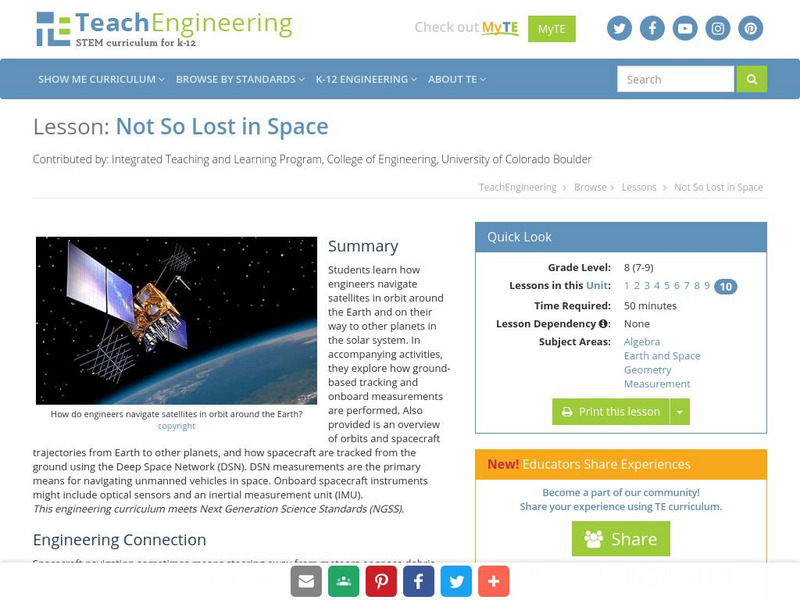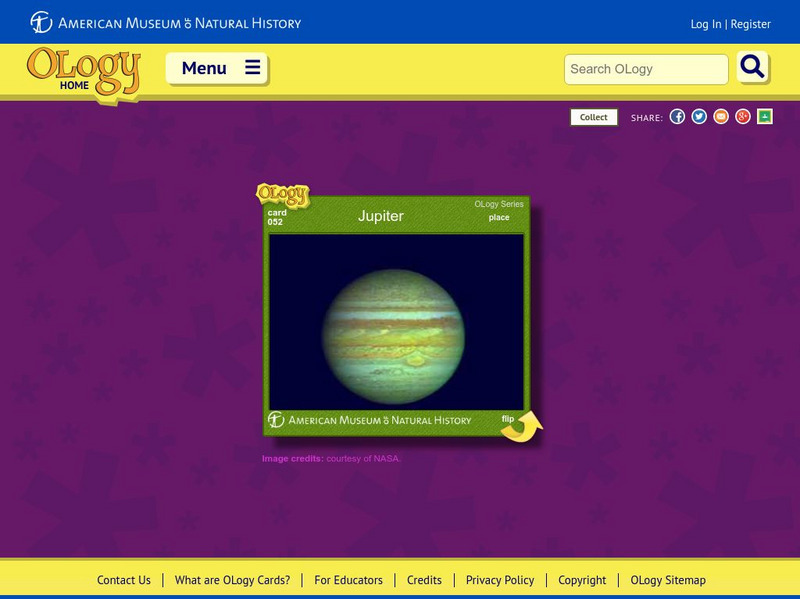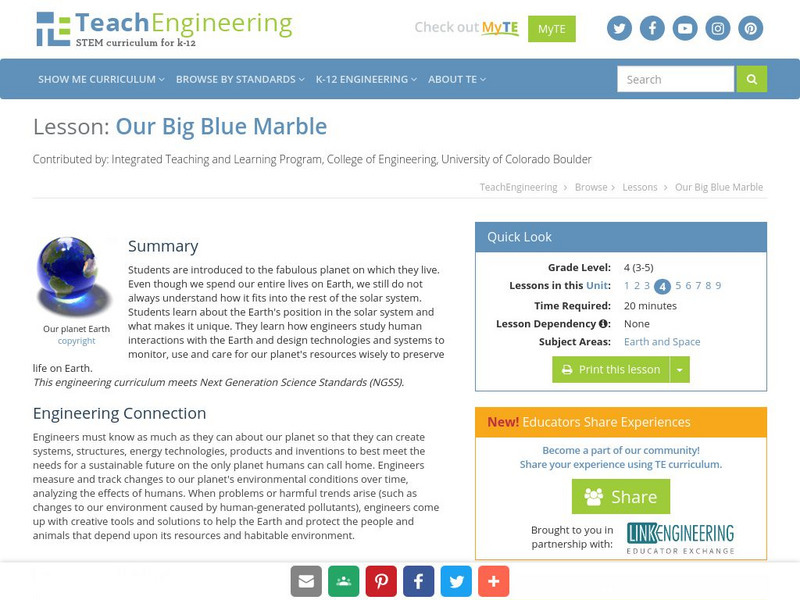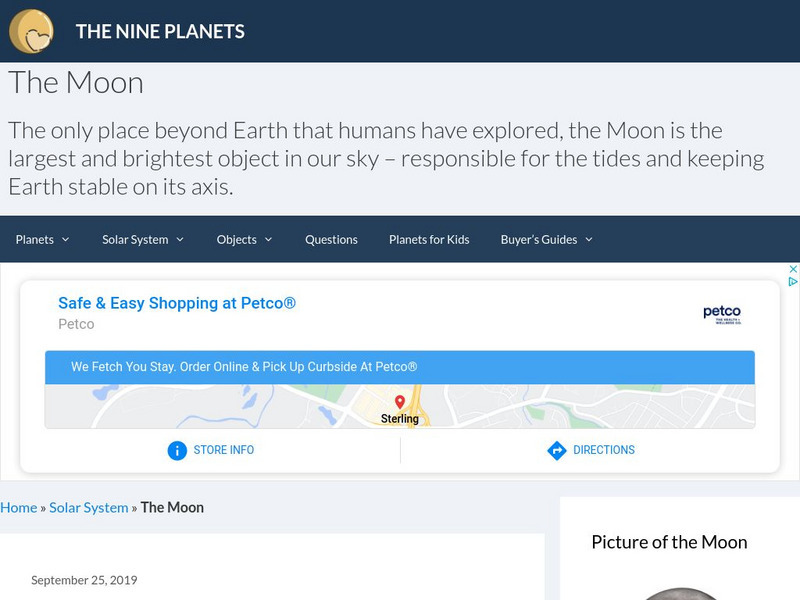Science Buddies
Science Buddies: How Big Are the Planets in Our Solar System?
This activity explores the relative size of the eight planets that circle around the Sun.
National Geographic
National Geographic: Extreme Weather on Other Planets
Examine the variety of weather found on all of the planets in the solar system with this classroom exercise. Students will see a video and observe differences and similarities among the planets.
TeachEngineering
Teach Engineering: Not So Lost in Space
Students learn how engineers navigate satellites in orbit around the Earth and on their way to other planets in the solar system. In accompanying activities, they explore how ground-based tracking and onboard measurements are performed....
Alabama Learning Exchange
Alex: Inner and Outer Planets of the Solar System
In this science lesson learners will work collaboratively to learn and introduce the eight planets, sizes, characteristics, and their order. They will use size comparisons, research a planet, design a poster and create a PowerPoint...
Alabama Learning Exchange
Alex: Lost in Space a Solar System Study
During this technology based lesson, students navigate the Internet to learn interesting information about the solar system. They use the information to complete a worksheet and to create a puzzle or challenge for their classmates.
Nine Planets
The Nine Planets: Small Bodies
This site explores the smaller bodies in the solar system, namely the various asteroids and comets. Links are also provided for additional information on related subjects.
University of Texas at Austin
The University of Texas Mc Donald Observatory: Jupiter
Discover interesting facts about Jupiter, the largest planet in the solar system.
University of Texas at Austin
The University of Texas Mc Donald Observatory: Saturn
Discover interesting facts about Saturn, the second-largest planet in the Solar System.
NASA
Nasa: Planets in a Bottle
In this simple lesson, students grow yeast to learn how the climates on each of the nine planets would affect life.
NASA
Nasa Star Child: Planet Hop
Figure out your age and your weight on all the planets in the solar system using the formulas given here. Then type them into the correct place, and let the computer check to see if you are correct.
American Museum of Natural History
American Museum of Natural History: Jupiter O Logy Card
Flip this interactive card to start learning about Jupiter, the largest planet in our solar system. Answer multiple-choice and fact-or-fiction questions and review some fast facts about Jupiter.
Science4Fun
Science4 Fun: Neptune
Learn fun facts and details about the atmosphere, composition, and discovery of Neptune, the last planet in our solar system.
NASA
Nasa: Cassini: Mission to Saturn
NASA site details what sets Saturn apart from the other planets in our solar system and why the Cassini spacecraft mission is important.
TeachEngineering
Teach Engineering: Our Big Blue Marble
Young scholars are introduced to the fabulous planet on which they live. Even though we spend our entire lives on Earth, we still do not always understand how it fits into the rest of the solar system. Students learn about the Earth's...
Nine Planets
The Nine Planets: The Moon
Explore the mythology, structure, observational history, gravitational force, and orbit of Earth's Moon.
NASA
Nasa Star Child: Where Oh Where Does That Little Object Go?
See if you can identify the positions of the 9 planets in our solar system. Take an online quiz and get feedback on your answers.
Other
Lunar and Planetary Institute: Explore! Jupiter's Family Secrets
A variety of hands-on activities, investigations, and explorations designed to engage learners in discovering planet Jupiter.
NASA
Goddard Education: Eclipse 99
Information is provided about the eclipse of 1999; in addition, facts about elcipses throughout history are also included.
Other
Celestia
This site provides a free space simulation that lets you explore the universe in three dimensions. There is a forum for teachers and lesson plans that help enhance student use of the simulation. A program must be downloaded in order to...
Ducksters
Ducksters: Space Science: Astronomy for Kids
Kids learn about astronomy, the study of outer space including the stars, planets, comets, black holes, and the Solar System. History and astronomers in this astronomy for teachers and kids section.
Exploratorium
Exploratorium: Your Age on Other Worlds
How old would you be on Mars? Venus? Have fun plugging in your birthdate to see your age on other planets then read scroll down for a full explanation.
European Space Agency
European Space Agency: Esa Kids: Our Universe: Supernovas
A basic overview of supernovas. Links to more information about starts, planets and other objects in our solar system and galaxy are included.
Other
Hong Kong Space Museum
Besides an introduction to exhibitions and events at the museum, the site provides a guide to stargazing, an astronomy FAQ, space news, virtual tours (see site map) and research resources (including Chinese-English star and constellation...
Science Buddies
Science Buddies: Stargazing for Satellites
Did you know you can see many satellites with the naked eye? Try this activity and find out for yourself!











